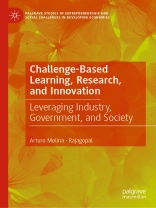Challenge-based research focuses on addressing societal and environmental problems. One way of doing so is by transforming existing businesses to profitable ventures through co-creation and co-evolution. Drawing on the resource-based view, this book discusses how social challenges can be linked with the industrial value-chain through collaborative research, knowledge sharing, and transfer of technology to deliver value.
The work is divided into three sections: Part 1 discusses social challenges, triple bottom line, and entrepreneurship as drivers for research, learning, and innovation while Part 2 links challenge-based research to social and industrial development in emerging markets. The final section considers research-based innovation and the role of technology, with the final chapter bridging concepts and practices to shape the future of society and industry. The authors present the RISE paradigm, which integrates people (society), planet (sustainability), and profit (industry and business) as critical constructs for socio-economic and regional development.
Arguing that the converging of society and industry is essential for the business ecosystem to stay competitive in the marketplace, this book analyzes possible approaches to linking challenge-based research with social and industrial innovations in the context of sectoral challenges like food production, housing, energy, biotechnology, and sustainability. It will serve as a valuable resource to researchers interested in topics such as social challenges, innovation, technology, sustainability, and society-industry linkage.
Mục lục
Chapter 1: Social Challenges in Developing Economies: Converging Research and Industrial Needs.- Chapter 2: People, Planet, and Profit: Crossing the Triple Bottom Line.- Chapter 3: Sensitizing Entrepreneurship: Managing Growth Touchpoints.- Chapter 4: A Challenge-based University: Learning, Research, Innovation and Entrepreneurship.- Chapter 5: Linking Research and Business: Raising Social Wellbeing.- Chapter 6: Research Technology and Institutions: Fostering Role, Relationship, and Responsiveness.- Chapter 7: Research-based Innovation: Economics, Transferability, and Consumerism.- Chapter 8: Technology Thrust: Design, Development, and Diffusion.- Chapter 9: Social Innovation and Technology: The Road Ahead.
Giới thiệu về tác giả
Arturo Molina, Ph D is currently Professor and Director of the Institute of Advanced Materials for Sustainable Manufacturing at Tecnológico de Monterrey, Mexico and served as Vice-Rector for Research and Technology Transfer. He is member of the National Researchers System of Mexico of highest level (SNI-Level III), Mexican Academy of Sciences, Mexican Engineering Academy, Mexican Academy of Computation.
Rajagopal, Ph D is Distinguished Professor of Marketing at EGADE Business School of Tecnológico de Monterrey, Mexico, Visiting Professor at Boston University, USA, and Life Fellow of the Royal Society for Encouragement of Arts, Manufacture and Commerce, UK. He is member of the National Researchers System of Mexico of highest level (SNI-Level III). Rajagopal has received highest civilian honor of the Government of India for non-resident Indian citizen in the field of education.












